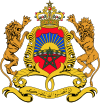Hyayna
This article needs additional citations for verification. (July 2016) |
The Hyayna or Hyaynas (Arabic: حياينة) is a Moroccan tribal confederation of Arab-Berber descent.[1][2] The confederation is composed of three tribes : Oulad Amrane, Ouled Aliane and Ouled Riab.
Spanish historian Luis del Marmol Carvajal, who traveled the country in the mid-sixteenth century (precisely in 1540), spoke of a rich agricultural tribe which had 25 villages and provided four thousand combatants to the Saadi dynasty.
In the seventeenth century written mention for the first time the word "Hyayna". The installation of this tribe northeast of the city of Fez seems to be in the middle of the sixteenth and the beginning of the seventeenth century. It seems they have accompanied the Saadi dynasty in its conquest of Morocco and its decision of Fez in 1549. Indeed, in order to close the corridor of Taza to Ottoman invaders from Algeria, Saadians implemented guich tribes (tribal soldiers) in this militarily strategic area to defend Fez.
Culture[]
Languages[]
Hyayna tribes speak Moroccan Darija and their dialect is classified as a Hilalian dialect by many linguists. Their speech is quite similar to Cheraga's and Oulad Jamaa's ones.
Olive oil production[]
Alwana, also known as Ghalghoula, is a famous olive oil made from roasted green olives, which gives them their very special taste. Before the official picking, they pick the first olives, dry them in the oven, and then they are pressed in a traditional olive presses which it gives an olive oil like no other.
The Hyayna are also known for their semolina hand-crafted flat bread known as Harcha.[3]
Folklore[]
The Hyayna are widely known for their traditional dance which is called Al Hayti or Hayti. In this dance, most of the hayani dancers use the bendir and two of them use the ghayta. Hyayna, like many other Moroccan tribes, are fond of horses and Fantasia. Every year in Tissa, there is a Fantasia festival which is one of the most important festivals in the kingdom.
See also[]
References[]
- ^ Historical Dictionary of the Bedouins. Muhammad Suwaed. 2015. ISBN 978-1-4422-5451-0
- ^ Marocains du Nord: entre la mémoire et le projet, pages 28, 29 & 32. Mohamed El Moubaraki, L'Harmattan, 1989, ISBN 9782738400505
- ^ Paula., Wolfert (2012). The food of Morocco. London: Bloomsbury. p. 116. ISBN 9781408827468. OCLC 793213717.
- Arab tribes in Morocco
